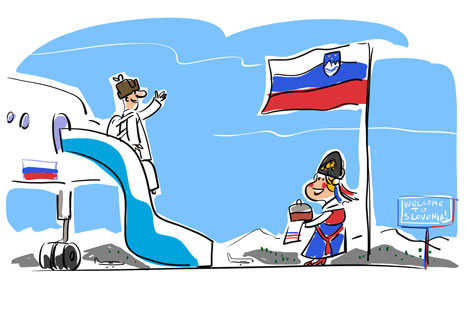Slovenia and Russia: a positive partnership

Click to enlarge the image. Drawing by Alexei Iorsch
I have a deep for Russia because of its timeless heritage in the cultural, scientific and economic fields.
The world owes a great debt of gratitude to the Russian giants in art, music and poetry, as they shone a light on the complexity of human existence and our mutual experience.
Both countries not only share the same colours in their national flags and a proximity in their languages, but both also recognise the importance of cultural community. In order to promote Slavic culture a Forum of Slavic Cultures has been established in the Slovenian capital, Ljubljana, with the aim of promoting cultural exchange. Naturally, Russia is a very important member of and contributor to this forum.
Related:
History proves the need for collective leadership
In the past, it was possible for a small group of world leaders to shape the world in one meeting: those days are gone. Today the world has grown enormously in terms of its complexity. Now people have their own voices and can actively participate in shaping their future.
The Russian and Slovenes have both experienced periods of hardship and sacrifice in their respective histories. This sacrifice and the heroism of Russian people during the First World War is recognised and remembered at the traditional annual remembrance service at the Russian Chapel under the Vršič Pass in the Julian Alps of Slovenia.
Many Russian prisoners of war lost their lives there, and this event has long served as a symbol of friendship between our two nations, and every year many people from both countries attend.
While we continue to honour our past we have to look towards the future, and recognise the benefits that will arise from our co-operation. Today, we face similar challenges and goals, namely: security; global economic competition; environmental degradation; the protection of human rights; and the promotion of stability and long-term prosperity.
Recently, Slovenia and Russia celebrated the 20th anniversary of the establishment of diplomatic relations. Top-level political dialogue was opened in 2001 when Slovenia hosted the Russian-American Summit. After that event, state level meetings between the two countries have been held on a regular basis.
Recently, our prime minister visited Moscow to further promote political and economic co-operation and to confirm Slovenian participation in the South Stream pipeline project.
Today, business and trade links are developing quickly between Russia and Slovenia; recently Russia started to invest on a larger scale in Slovenia. Russian interests in the metallurgical industry and in tourism are significant, while traditionally Slovenia has been an investor in Russia, mostly in the pharmaceutical sector.
Most Slovenian exports to Russia are pharmaceutical products, wireless telecommunication equipment, electrical machinery, mechanical systems and coatings. Imports mostly relate to oil and gas products, their derivatives and aluminium goods. These groups represent around 70-75% of our total imports from Russia.
Slovenia counts Russian tourists among its most important guests and can offer them a wide range of leisure, spa, recreation and entertainment possibilities.
Enjoying a combination of different geographical features in a relatively small area, Slovenia is often described as a microcosm of Europe. The result is a stunning variety of lifestyles and culture that our Russian friends like to enjoy.
It is worth mentioning at this point that the Slovenian consular and visa service is among the most efficient anywhere in Europe.
Slovenia is still the most developed country in the Central and Eastern Europe region measured on a per capita GDP basis, boasting world-class mechanical engineering, light aircraft and luxury boat sectors to mention only a few.
Russia, meanwhile, is one of the largest and fastest-growing economies in the world, making future economic co-operation between the two a bright prospect.
In addition to these bilateral relations, both countries strive to enrich the relevant agenda in international organisations where the respective countries are members, such as the European Union, OSCE or the UN.
Last but not least, a traditional and friendly relationship between the two national diplomacies is a great asset in all these endeavours.
Iztok Jarc is the Ambassador of Slovenia to the United Kingdom.
All rights reserved by Rossiyskaya Gazeta.
Subscribe
to our newsletter!
Get the week's best stories straight to your inbox
